
Saxifraga is the largest genus in the family Saxifragaceae, containing about 465 species of holarctic perennial plants, known as saxifrages or rockfoils. The Latin word saxifraga means literally "stone-breaker", from Latin saxum + frangere. It is usually thought to indicate a medicinal use for treatment of urinary calculi, rather than breaking rocks apart.

Micranthes hieraciifolia is a species of flowering plants. It is native to Europe, North America and temperate Asia, being distributed throughout the high Arctic and some alpine areas like Norway and the Carpathian Mountains, with a few isolated populations in the Central Eastern Alps of Austria and the Massif Central of France. It is generally uncommon.

Micranthes virginiensis, the early saxifrage, or Virginia saxifrage, is a wildflower native to eastern and central North America.
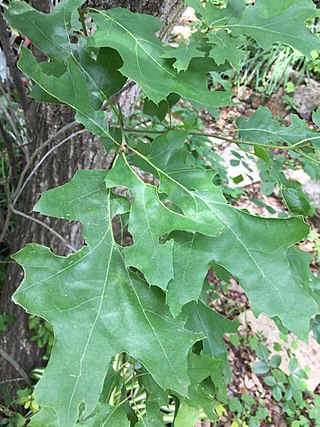
Quercus buckleyi, commonly known as Texas red oak or Buckley's oak, is a species of flowering plant. It is endemic to the southern Great Plains of the United States.

Micranthes nivalis is a plant species in the saxifrage family. It is commonly called snow saxifrage or (ambiguously) alpine saxifrage.
Alpine saxifrage is a common name for several different plants and may refer to:

Micranthes bryophora is a species of flowering plant known by the common name bud saxifrage. It is native to the western United States, where its two varieties are geographically separated. The more common var. bryophora is endemic to the mountains of California, and the rare var. tobiasiae is known only from the Payette National Forest of western Idaho.
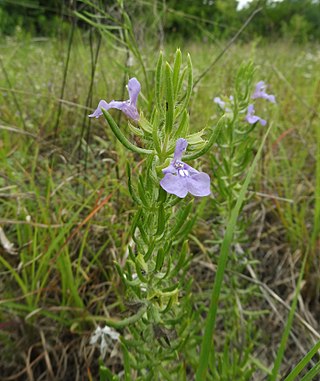
Salvia texana, commonly called Texas sage, is a species of flowering plant in the mint family (Lamiaceae). It is native to North America, where it is found in northern Mexico, and in the U.S. states of Texas and New Mexico. Its natural habitat is dry areas on limestone soils, in prairies or over rock outcrops.

Micranthes ferruginea is a species of flowering plant known by the common names russethair saxifrage and rusty saxifrage. It is native to western North America from Alaska and northwestern Canada to northern California to Wyoming, where it can be found in moist, rocky habitat in mountainous areas. It is a perennial herb growing from a caudex and rhizome system and producing a basal rosette of leaves. Each leaf is up to 6 centimeters long, thick and fleshy with large teeth along the edges. The inflorescence arises on a slender, hairy peduncle up to 40 centimeters tall. Thin branches bear flowers and reproductive bulbils. Each flower has spade-shaped white petals, the upper ones dotted with gold.

Micranthes tolmiei is a species of flowering plant known by the common name Tolmie's saxifrage, or Tolmie's alpine saxifrage. It is native to western North America from Alaska to Montana to California, where it grows in rocky mountain habitat types, especially in alpine climates, such as talus and fellfields. It is a small perennial herb growing in mats of creeping stems lined with thick, fleshy leaves each up to 1.5 centimeters long. The inflorescence arises on a stout, erect peduncle with a few stubby bracts midway up. The flowers have narrow white petals and petal-like white stamens.

Micranthes micranthidifolia is a member of the Saxifrage family with the common names lettuceleaf saxifrage, branch lettuce and brook lettuce. It grows in wet areas and mountain streams.
Gutierrezia texana is a North American species of flowering plant in the family Asteraceae known by the common name Texas snakeweed. It is native to the south-central United States and northern Mexico as far south as Guanajuato and Hidalgo.

Micranthes is a genus of flowering plants in the saxifrage family. It was formerly included within the genus Saxifraga until recent DNA evidence showed the members of what is now Micranthes are more closely related to Boykinia and Heuchera than to other members of the genus Saxifraga.

Micranthes petiolaris, commonly known as cliff saxifrage, is a species of flowering plant in the saxifrage family. It is native to the Southern Appalachian Mountains where it is found on exposed boulders and rocky seeps, often at high elevation. It is a perennial that produces small white flowers with yellow spots in the summer.

Micranthes californica, known by the common name California saxifrage, is a species of flowering plants.
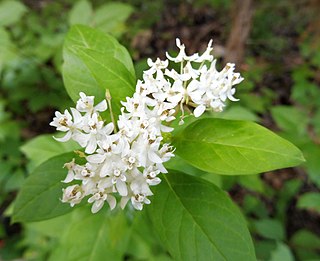
Asclepias texana, commonly called Texas milkweed, is a species of flowering plant in the dogbane family (Apocynaceae). It is native to North America, where it is widespread in the regions of the Chihuahuan Desert and Edwards Plateau. Its range spans from the states of Durango and Coahuilla in Mexico, north to the state of Texas in the United States. Its natural habitat is in dry rocky areas in canyons or along arroyos.

Vernonia texana, commonly called Texas ironweed, is a species of flowering plant in the aster family (Asteraceae). It is native eastern to North America, where it is found primarily in the South Central region of the United States. Its natural habitat is in open sandy woodlands.
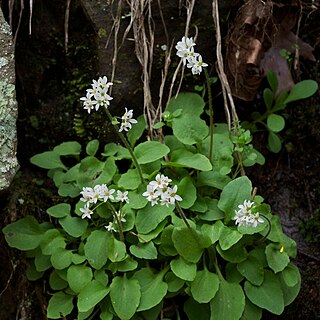
Micranthes palmeri, commonly called Palmer's saxifrage, is a species of plant in the saxifrage family that is native to Oklahoma and Arkansas in the United States.
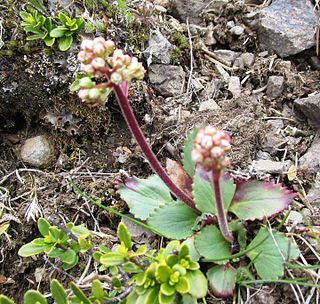
Micranthes occidentalis, commonly known as western saxifrage, is a species of flowering plant native to North America.

















